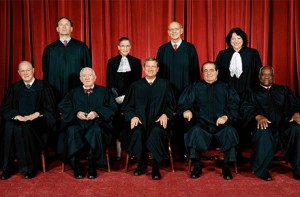I wrote last week about the plutocracy or corporatocracy which has emerged as the dominant force in American politics. Today, Bloomberg News has a teaser article up featuring an interview with Justice Stephen Breyer, who was appointed to the court by Bill Clinton in 1994. Before I get into the substance of the post, permit me to point out that Bloomberg News is a subsidiary of Bloomberg L.P., a company with revenues in the billions of dollars, and owned by Michael Bloomberg, the mayor of New York City and America’s 10th richest person. See how money, the media and politics all work together? And I’m sure this was entirely coincidental, but Bloomberg TV was severely reprimanded a few years ago in the United Kingdom for breaching British rules on broadcasts before elections. It seems that Bloomberg covered the Labour Party’s “Business Manifesto”, but failed to provide equal coverage to the Conservative or Liberal Democratic parties. No surprise here, but the “Business Manifesto” was a corporate dream:
It promised companies it would “maintain a competitive tax environment for businesses”, and offered new promises to curb regulation – though stopped short of ruling out tax increases. Secretary of State for Trade and Industry Patricia Hewitt said:
Labour has now replaced the Tories as the party of enterprise and the party of business.

And to think that Labour was historically the socialist party in the U.K. Anyway, enough of that aside, but I did want to set the stage properly. Since this article was a teaser for a more in-depth article to come, it’s extremely light on the details. Here is the relevant section:
Justice Stephen Breyer rejected the notion that the U.S. Supreme Court has a pro-business slant and said the court doesn’t rule in favor of companies any more frequently than it has historically.
“I looked back,” he said in a Bloomberg Television interview in which he discussed his new book. “I couldn’t find a tremendous difference in the percentage of cases. They’ve always done pretty well.”
The U.S. Chamber of Commerce won at least a partial victory in 13 of the 16 cases in which it filed a brief during the court term that concluded in June. The business trade group has won at least half its cases every year for more than a decade.
So the Chamber get 13/16 this term, and has consistently won more than half of it’s cases for more than a decade, and yet there’s no pro-business slant? Maybe the Chamber can just afford the best attorneys, but doesn’t that really amount to the same thing?

Without more actual quotations, it’s difficult to determine what Breyer was actually saying. The headline to the story reads “Breyer says Supreme Court doesn’t have pro-business slant.” But that’s not actually what was said– what he actually said is “They’ve [business] always done pretty well.” You’ll get no argument from me, business has always done pretty well, but that’s not the same as saying there’s no pro-business slant. If anything, it’s an acknowledgment that there has always been a pro-business tilt to the court. Q.E.D.
It seems to me that perhaps Breyer was reacting to the recent Op-ed in the New York Times which presented the case that there is more concern for business needs under Chief Justice Roberts:
The Supreme Court enjoys all but free rein in selecting which cases to review. From the end of one term in the summer until the start of the next, on the first Monday in October, the work of the court is to sift through thousands of petitions from parties that lost in one of the federal appeals courts or highest state courts and are eager for the justices to reverse their fate.
The kinds of petitioners favored say a lot about the court’s interests and biases. The Warren court, eager to champion individual rights, chose a large number of petitions from downtrodden people. The Rehnquist court, looking for opportunities to vindicate states’ rights, favored petitions from the states.
The Roberts court has championed corporations. The cases it has chosen for review this term suggest it will continue that trend.


Brynn:
Given the trend, here are the U.S. Supreme Court decisions we will be seeing within the next five years:
– Blaspheming a corporation will become a federal crime, in the absence of any federal statute specifying this.
– The Supreme Court will rule that "freedom of speech" actually means "corporate control of speech."
– The Fourth and Fifth Amendments will be deemed repealed, except for large corporations.
The Constitutionality Accountability Center in Washington is releasing a study today which argues that the Court is more pro-business today than it was 25 years ago, before the appointment of Scalia who is the longest-serving justice. (source)